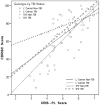Serotonin transporter genotype and mild traumatic brain injury independently influence resilience and perception of limitations in veterans
- PMID: 23478049
- PMCID: PMC3643301
- DOI: 10.1016/j.jpsychires.2013.02.006
Serotonin transporter genotype and mild traumatic brain injury independently influence resilience and perception of limitations in veterans
Abstract
Evidence indicates that individuals with the 5-HTTLPR variant short/short genotype have increased sensitivity to both positive and negative perceptions of perceived social support. The aim of this study was to evaluate this association among Veterans in the context of mild traumatic brain injury (TBI). As part of a larger TBI center, we performed a cross-sectional study of 67 OEF/OIF/OND Veterans (41 with TBI and 26 controls without TBI) who completed the questionnaires and consented to genetic testing. The primary measures included the Connor-Davidson Resilience Scale (CDRISC) and the Perceived Limitations in community participation subscale of the Community Reintegration of Service Members Instrument (CRIS-PL). Both 5-HTTLPR genotype and TBI status were independently associated with the CRIS-PL (p = .009 for genotype, p = .001 for TBI) and the CDRISC (p = .015 for genotype, p = .003 for TBI) scores. This study suggests that both the 5-HTTLPR genotype and TBI status independently, in an almost equal but opposite direction, influence resilience and perceived limitations to social participation. Further, resilience appears more sensitive to perceived limitations in Veterans carrying an S'S' genotype than in L' carriers, but only in the context of having sustained a TBI. While having a TBI appeared to increase a Veteran's sensitivity to social stress, the Veteran's who were L' allele carriers with a TBI fared the worst, with lower resilience and more perceived limitations for community participation compared to L' carrier Veterans without a TBI or Veterans with the S'S' genotype regardless of TBI status.
Published by Elsevier Ltd.
Figures


Similar articles
-
Effect of the 5-HTTLPR polymorphism on posttraumatic stress disorder, depression, anxiety, and quality of life among Iraq and Afghanistan veterans.Anxiety Stress Coping. 2015;28(4):456-66. doi: 10.1080/10615806.2014.973862. Epub 2014 Nov 14. Anxiety Stress Coping. 2015. PMID: 25314020 Free PMC article.
-
Intimate Partner Violence Among Female OEF/OIF/OND Veterans Who Were Evaluated for Traumatic Brain Injury in the Veterans Health Administration: A Preliminary Investigation.J Interpers Violence. 2020 Jul;35(13-14):2422-2445. doi: 10.1177/0886260517702491. Epub 2017 Apr 18. J Interpers Violence. 2020. PMID: 29294714
-
Resilience, traumatic brain injury, depression, and posttraumatic stress among Iraq/Afghanistan war veterans.Rehabil Psychol. 2015 Aug;60(3):263-76. doi: 10.1037/rep0000050. Epub 2015 Jul 27. Rehabil Psychol. 2015. PMID: 26214528 Free PMC article.
-
Self-report measures to identify post traumatic stress disorder and/or mild traumatic brain injury and associated symptoms in military veterans of Operation Enduring Freedom (OEF)/Operation Iraqi Freedom (OIF).Neuropsychol Rev. 2012 Mar;22(1):35-53. doi: 10.1007/s11065-012-9191-4. Epub 2012 Feb 19. Neuropsychol Rev. 2012. PMID: 22350740 Review.
-
Static and Dynamic Factors Promoting Resilience following Traumatic Brain Injury: A Brief Review.Neural Plast. 2015;2015:902802. doi: 10.1155/2015/902802. Epub 2015 Aug 4. Neural Plast. 2015. PMID: 26347352 Free PMC article. Review.
Cited by
-
Prominent genetic variants and epigenetic changes in post-traumatic stress disorder among combat veterans.Mol Biol Rep. 2024 Feb 23;51(1):325. doi: 10.1007/s11033-024-09276-0. Mol Biol Rep. 2024. PMID: 38393604 Review.
-
Pharmacogenetics and Pharmacotherapy of Military Personnel Suffering from Post-traumatic Stress Disorder.Curr Neuropharmacol. 2017;15(6):831-860. doi: 10.2174/1570159X15666161111113514. Curr Neuropharmacol. 2017. PMID: 27834145 Free PMC article.
-
Pharmacogenetics of Addiction Therapy.Methods Mol Biol. 2022;2547:437-490. doi: 10.1007/978-1-0716-2573-6_16. Methods Mol Biol. 2022. PMID: 36068473
-
Characterizing the Risk of Depression Following Mild Traumatic Brain Injury: A Meta-Analysis of the Literature Comparing Chronic mTBI to Non-mTBI Populations.Front Neurol. 2020 May 19;11:350. doi: 10.3389/fneur.2020.00350. eCollection 2020. Front Neurol. 2020. PMID: 32508733 Free PMC article.
-
Genetic Variants Associated With Resilience in Human and Animal Studies.Front Psychiatry. 2022 May 20;13:840120. doi: 10.3389/fpsyt.2022.840120. eCollection 2022. Front Psychiatry. 2022. PMID: 35669264 Free PMC article.
References
-
- Belanger HG, Uomoto JM, Vanderploeg RD. The Veterans Health Administration System of Care for Mild Traumatic Brain Injury: Costs, Benefits, and Controversies. Journal of Head Trauma Rehabilitation. 2009;24:4–13. - PubMed
-
- Brody G, Beach S, Philibert R, Chen Y, Murry V. Prevention effects moderate the association of 5-HTTLPR and youth risk behavior initiation: gene x environment hypotheses tested via a randomized prevention design. Child Development. 2009b;80:645–661. - PubMed
-
- Carli V, Mandelli L, Zaninotto L, Roy A, Recchia L, Stoppia L, Gatta V, Sarchiapone M, Serretti A. A protective genetic variant for adverse environments? The role of childhood traumas and serotonin transporter gene on resilience and depressive severity in a high-risk population. European Psychiatry: the Journal of the Association of European Psychiatrists. 2011;26:471–478. - PubMed
Publication types
MeSH terms
Substances
Grants and funding
LinkOut - more resources
Full Text Sources
Other Literature Sources
Medical
Research Materials

